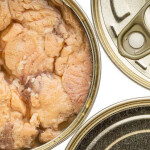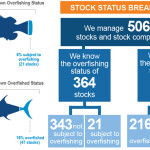The North Pacific Fisheries Commission (NPFC) decided to close gaps in management, improve the vessel authorization process, report transshipment of bycatch species, and require reporting of International Maritime Organization (IMO) numbers at its latest meeting – held nearly a year late.
The seventh annual session of the commission, held in Sapporo, Japan, from 22 to 24 March, 2023, was originally scheduled for 28 to 30 March, 2022, but the meeting was postponed as Western countries tried to isolate Russia in the days following its invasion of Ukraine.
Transshipment was a key issue for the NPFC, as the region the commission covers sees a large amount of transshipments with little oversight, The Pew Charitable Trusts Senior Associate Raiana McKinney – who attended the meeting as an observer – told SeafoodSource.
“At the NPFC, 85 percent of the catch is transshipped, and it’s poorly regulated. The current measure only applies to bottom fisheries, but NPFC covers a fabulously broader range of species, other than those in bottom fisheries. These regulations are extremely outdated. They were created in 2016, and so much has changed. So we really want to see the members get behind the small working group’s proposal to update it.”
The NPFC’s management area overlaps with a part of the ocean managed by the Western and Central Pacific Fisheries Commission (WCPFC), a separate RFMO overseeing regional tuna fisheries. The overlap makes it harder to monitor whether transshipped fish were legally caught, since a transshipping vessel can claim to have been transporting fish covered by the other RFMO. The lack of a mechanism for sharing information between the two RFMOs is a weak link in the system.
At the meeting, the NPFC took steps to change that. The commissioned approved a proposal for a data-sharing agreement with the Western and Central Pacific Fisheries Commission (WCPFC) and the South Pacific Regional Fisheries Management Organization (SPRFMO), which manages mackerel, squid and some deep-sea fishing. When signed by both RFMOs, this will increase transshipment oversight in overlap areas, and allow for the sharing of scientific data and best practices.
The NPFC took other actions to increase cooperation across the fishing region, such as committing to the development of a regional observer program. Though there were fishery observers already in the region, these programs were at the national level, and each party was only required to report its total annual catch – but no data on bycatch was required. McKinney said that Pew hopes to see greater real-time data submission in the wake of the program.
The commission also adopted a measure on shark management. The new measure prohibits shark-finning and requires better reporting of shark catches.
The Pew Charitable Trusts has urged the NPFC to move forward on a Port State Measures Conservation Management Measure (CMM). This would allow port inspections even when a vessel is not importing goods, to check for IUU seafood. Carrier activity is currently high, but there are no port inspections in the NPFC area, McKinney said.
Another issue not mentioned in the NPFC’s press release regarding the results of the meeting is transparency in management. In February of 2021, Pew published an article, “North Pacific Fisheries Commission’s Poor Transparency Is Hurting Sustainability,” citing a lack of access for NGOs to the small group’s technical meetings that make recommendations to the full NPFC.
The lack of transparency is in direct contrast to the ...
Photo courtesy of the North Pacific Fisheries Commission








